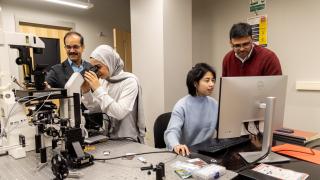
External Awards Received
The Office of Research is pleased to announce and would like to congratulate our Dearborn faculty members on receipt of the following external funding:
U-M Principal Investigator: Pravansu Mohanty
Project Title: Digital Enterprise Technology for the Optionally Manned Fighting Vehicle
Sponsor: Department of Defense (Army) through the National Center for Manufacturing Sciences
Total Sponsor Authorized Amount: $3,530,221
Professor Mohanty and his team will develop and demonstrate the digital environment to enable seamless, resilient, transparent and secure information sharing for design, manufacturing, testing and validation of ground vehicle systems components.
U-M Principal Investigator: Youngki Kim
Project Title: EV Lithium-ion Battery Testing at Low Temperatures
Direct Sponsor: Hyundai America Technical Center
Total Sponsor Authorized Amount: $29,442
Automotive applications face a challenge with Li-ion batteries due to their significant performance degradation at low temperatures, resulting in reduced mileage and cycle life. Associate Professor Kim’s team will provide testing for various charging/discharging at low temperatures to determine an optimal approach.
Announcements
Season Days/Holiday and Campus Closure Impact on Proposal Submissions
Please be aware of the following dates and the potential impact on proposal submissions:
- The UM-Dearborn Office of Research will be CLOSED from 5 pm December 20, 2023 until 8 am January 2, 2024
- Any proposals due to the sponsor between December 21, 2023 and January 2, 2024 must be received by the Dearborn Office of Research no later than December 14, 2023 (in final, ready-to-submit form) to meet the university’s internal deadline for submission.
Please plan accordingly, and recognize that staff work on proposals will be paused during the season break as staff will not be available during this time.
Post-Award Services Update
For the past two years, under the leadership of Leigh McGrath, the centralized Post-Award Services (PAS) unit has worked to establish a dedicated post-award grant management operation, supporting all campus units engaged in research and sponsored project activities.
Effective December 1, Leigh returned to focusing her efforts exclusively on her role as the Director of Business Operations in CECS. We would like to thank Leigh for her dedication and service to the campus in managing PAS over the past two years. The team has succeeded in implementing streamlined processes and enabling robust post-award administrative support to enhance capability and bolster UM-Dearborn’s strategic goal of increasing research capacity. Leigh and the PAS team have ensured that our faculty and principal investigators have the support they need for critical grant management and administration.
The current PAS team members are Mike DeVoe, who has been on the team since its inception, and Stephanie Miree, who joined UM-Dearborn in May. Going forward, the PAS unit has merged into the Office of Research Administration team, reporting directly to Pat Turnbull. Mike and Stephanie will continue to provide post-award services and requests for support should still be sent to [email protected].
Please join us in thanking Leigh for her efforts and recognizing the staff of the PAS team who will continue to work collaboratively to provide these important services for our researchers.
Research Data Stewardship Policy Takes Effect January 1, 2024
A new U-M policy that sets expectations and guidance for the stewardship of research data, focusing on issues of ownership, sharing and retention, takes effect on January 1, 2024.
The SPG, developed as part of the Research Data Stewardship Initiative, with extensive input from a wide range of faculty and staff groups, outlines how storage and access to data generated by U-M researchers should be administered. The new policy also outlines expectations for U-M researchers to make research data publicly available when possible, taking into account any existing agreements, contracts, sensitivities or protections. Review the research data stewardship policy here.
Arts Research: Incubation & Acceleration - Funding Opportunity
The new Arts Research: Incubation & Acceleration (ARIA) program seeks to elevate and expand arts research and creative practice across U-M’s campuses and schools. The program will support projects centered in the arts that ask creative questions and move toward new ideas and knowledges; invite new forms of collaboration and interaction both within and beyond the arts; and imagine new approaches to problems and ideas in the arts and society.
Applications are particularly encouraged from interdisciplinary research teams structured to provide mutual benefit to those in the arts and in other research sectors, and from individuals working in creative practice to imagine new horizons of artistic possibility. Faculty applying for individual projects are eligible for up to $25,000, and research teams are eligible for up to $50,000. First round applications are due December 11 by 5 pm. Learn more and apply.
Research Grants on Preventing & Alleviating Poverty
Poverty Solutions invites faculty at U-M's Ann Arbor, Dearborn, and Flint campuses to pursue research projects that can inform existing policies, practices, or interventions meant to prevent or reduce poverty or research that lays out proposals for future policy directions. Junior faculty are encouraged to apply, and partnerships with faculty across multiple campuses are strongly encouraged.
Poverty Solutions will award up to five grants of $20,000 each on a rolling basis; there is no set deadline to apply for the funding. See the RFP for guidelines and application instructions. Questions can be directed to [email protected]
Anti-Racist Digital Research Institute Mini-Grant Program
The Anti-Racist Digital Research Institute is a week-long institute and mini-grant program to help develop digital research ideas and provide planning support for the conceptualization of a project focusing on anti-racist or reparative research methodologies. This institute will award up to six grants, $5,000 each. Awardees will work with peers and digital scholarship technical and methodological experts to develop an ethical, sustainable, justice-oriented digital project proposal or plan.
Applications are due December 22 and open to faculty, post-doctoral researchers, graduate students and staff of U-M's three campuses. Learn more about the application or join an online Q&A information session on December 19, 3:30-4:30 pm.
Packard Foundation Fellowship for Early-Career Faculty
Packard Foundation Fellowships support early career faculty in physics, chemistry, mathematics, biology, astronomy, computer science, earth science, ocean science and all branches of engineering. U-M can submit two awards per institution. The U-M internal deadline for the limited submission application is January 15, 2024, and requires a research statement, NIH formatted biosketch and three possible reference letter writers.
Insights and advice about the Packard Foundation can be found on Foundation Relations’ webpage (requires U-M weblogin).
NSF Mid-Career Advancement (MCA) Program
The NSF Mid-Career Advancement (MCA) program supports eligible mid-career scientists and engineers to substantively enhance and advance their research program and career trajectory. It provides support for protected time, resources, and the means to gain new skills through synergistic and mutually beneficial partnerships. The current application window is February 1, 2024 - March 1, 2024; proposals will be accepted each February 1 - March 1 annually thereafter.
MCA program synopsis: “The MCA offers an opportunity for scientists and engineers at the mid-career stage to substantively enhance and advance their research program and career trajectory. MCA support is expected to help lift constraints to reduce workload inequities and enable a more diverse scientific workforce (more women, persons with disabilities, and individuals from groups that have been underrepresented) at high academic ranks.
Participating programs in the Directorates for Biological Sciences (BIO), Geosciences (GEO), Social, Behavioral and Economic Sciences (SBE), Education and Human Resources (EHR), and Technology, Innovation and Partnerships (TIP) will accept MCA proposals. To help identify the disciplinary program in which the MCA should be reviewed, PIs are urged to investigate the research areas supported by the different directorates and participating programs. View the NSF MCA Contact list.
Read about the three key objectives of the solicitation, plus tips for successful proposals in the NSF 101 for the Mid-Career Advancement program. As a reminder, there are also many Research Development resources available through the Office of Research when preparing a proposal.
Mardigian Library Support for Data Management Plans
Data management plan support available from the UM-Dearborn Mardigian Library. Data management planning is often required by funders in the form of a document called a Data Management Plan (DMP) that will describe the handling (collection, storage and archiving) of data collected during your project. A DMP may also need to include plans for the dissemination of your data, (sometimes referred to separately as a Data Sharing Plan). To help faculty navigate data management planning, the UM-Dearborn Mardigian Library offers both a subject guide on Research Data Management as well as a DMP review service.
The UM-Dearborn Mardigian Library’s Research Data Management subject guide covers definitions, online tools for creating a DMP, guidance from ICPSR, example plans and more. Read the Research Data Management subject guide to learn more about DMPs.
UM-Dearborn librarians are also available to help answer questions and offer support to faculty improving their DMPs as a part of their DMP review service. To contact a librarian for a DMP review, fill in their DMP review request form.
IRB Liaison & Upcoming Human Subjects Information Session
Effective February 1, 2023, Elizabeth Molina became the new IRB-HSBS staff liaison for UM-Dearborn.
Elizabeth will hold regularly-scheduled virtual sessions for anyone interested in learning more about working with human subjects and/or the IRB application and approval process. The final session this fall semester will be held on Wednesday, December 20, 2023 from 2:00-3:30 PM - .
Any UM-Dearborn faculty, staff, or students with questions about the IRB process can also contact Elizabeth by email at [email protected], by phone at 734-936-1943 or by dropping into the monthly Zoom sessions offered. Additional information about working with human subjects can be found at the IRB Health Sciences and Behavioral Sciences website.
Reminder: Resources for Using SciENcv
Effective October 23, 2023 NSF requires all biosketch and current & pending support documents for senior personnel to be prepared using SciENcv. The fillable pdf forms are no longer accepted. We recommend that you take the time to register with ScieENcv and begin to create your documents in that system if you expect to be involved in a proposal to NSF in the near future.
U-M Library Services has put together this guidance page to help you get started. You can also request a one-on-one Zoom session with Dearborn Office of Research staff to walk you through this process. Science Experts Network Curriculum Vitae (SciENcv) is a researcher profile system for all individuals who apply for, receive or are associated with research investments from federal agencies. SciENcv allows researchers to document their education, employment, research activities, publications, honors, research grants, & other professional contributions to create multiple SciENcv profiles in official biographical sketch formats funding agencies such as the National Institutes of Health (NIH), the National Science Foundation (NSF), and the Institute of Education Sciences (IES). In addition, the SciENcv application can be used to create the official NSF Current and Pending Support document.
Any researcher can register for SciENcv and create multiple biosketches, for different research projects or different funding agencies. You can find much more information about how to use SciENcv on their FAQs page. The central Office of Research and Sponsored Programs and U-M Library have resources and previous workshops available on how to create a biosketch in SciENcv specifically focused on NSF and NIH. These resources are available linked below:
- U-M Library SciENcv Guide (including step-by-steps for creating NSF and NIH biosketches)
- NSF Biosketch and SciENcv Webinar (July 2020)
- Slide Deck (MLibrary Presentation)
- NSF Biosketch Webinar Transcript
- How to Create Your NSF Biosketch in SciENcv Step-by-step (MLibrary Handout)
- NIH Biosketch and SciENcv Webinar (May 2020)
- Slide Deck (MLibrary Presentation)
- NIH Biosketch Webinar Transcript
- Biosketch and SciENcv Step-by-Step (MLibrary Handout)
If you have questions about SciENcv, need additional support, or would like to schedule one-on-one assistance with setting up your SciENcv profile and documents, please email our office at [email protected].
Research Events in December
- MIDAS, Digital Studies Institute, Institute for Research on Women & Gender, and Women of Color Code mini-symposium, “Rewriting Conventional Societal Narratives with Data and AI” - Wednesday, December 6th, 2:10 - 4:30PM, virtual
- Anti-Racist Digital Research Institute Mini-Grant Program Information Session Q&A - Tuesday, December 19th, 3:30-4:30PM, virtual
- IRB, “Virtual On-the-Road Session” - Wednesday, December 20th, 2-3:30PM, virtual
The Office of Research website is also updated regularly with research-related events and announcements, so we would encourage you to bookmark our landing page and subscribe to our Research News email list.
Research Resource Highlight: Zotero Citation Management Tool
Every month, the Office of Research features a resource and/or tool that is available for researchers. This month we are featuring U-M resources and guides for Zotero, a free citation management tool.
Zotero is a free, open-source software citation management tool that can create and organize personal and group libraries, annotate PDFs, add in-text citations, and more. It requires a download to run (Windows, MacOS, or Linux). Alternatively, ZoteroBib is a web-based option that helps build a bibliography instantly from any computer or device, without creating an account or installing any software.
For more information and guidance, check out the following resources provided by the Mardigian Library and Taubman Health Sciences Library for using Zotero and other citation management tools:
- Mardigian Library Citation Management Tools Guide by Nadine Anderson
- Zotero Quick Start Guide
- Zotero presentation (2019) provided by Raya Samet
- Taubman Health Sciences Library Zotero Guide
Upcoming Funding Opportunities
The Office of Research publishes a list of selected funding opportunities, organized by college, every month on our website under Announcements. In addition, yearly grant calendars organized by subject area provided by Hanover Research are available there as well. Contact the UM-Dearborn Office of Research if you would like more information about submitting a proposal to any of the programs.



